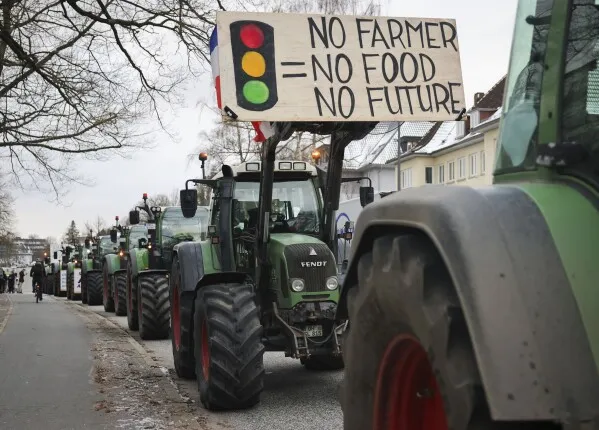German farmers are waging war: today is the big tractor protest, which is scheduled to march through Berlin and other German towns. According to agricultural groups, the demonstration will cause traffic gridlock on all national roads and highways until January 15.
The first convoys arrived in Hamburg and Bremen early in the morning, obstructing traffic as 200 tractors gathered around Berlin's Brandenburg Gate. Jochen Kopelke, the head of the German Police Union (GdP), urged protestors to remain peaceful in the face of the anticipated large numbers of demonstrators, saying that the police would need to respond swiftly and adaptably.
Joachim Rukwied, the head of the German Farmers' Association, has requested an apology for any trouble caused. The decision by Olaf Sholz's administration to reduce agricultural fuel subsidies, which would damage a sector already severely impacted by inflation and downward competition from Poland, a neighbor, is what sparked the mobilization.
Following the November decision by the Constitutional Court to block the transfer of 60 billion of Covid's unused debt to the climate fund, the chancellor opted to eliminate the exemption of farm vehicles from the automobile tax and reduce fuel subsidies.
The decision was made with the finance minister's support for the environment, which was highly valued by the EU commission and the Berlin government. Christian Lindner announced that the climate-harmful subsidies would be reduced by 3 billion euros, and he also announced an increase in the CO2 tax from 30 to 45 euros per ton for the combustion of fuel or gas.
Immediately protesting that they were below the survival criterion and that there are no electric tractors and that agricultural equipment can only run on diesel, the farmers made their position clear. Following the initial demonstrations, the government said that the reduction in agricultural subsidies would be delayed until 2026 and that the stamp tax would be partially repealed. Despite this partial reversal, the announcement failed to assuage the frustration of the farmers. The fibrillations have persisted for several weeks now. A few days ago, farmers prevented Robert Habeck, the minister of finance and climate protection, from alighting from the boat he was riding on by blocking the Schlüttsiel dock.
But starting today, the mobilization ought to climax. This demonstration is one of several that have been held over the course of many months in France and the Netherlands to highlight the grave risk that the EU's green policies pose to the continent's agriculture industry.
